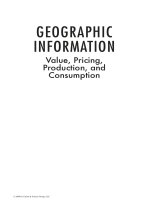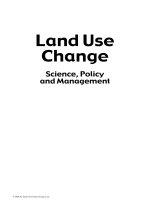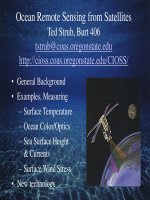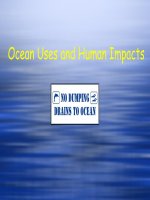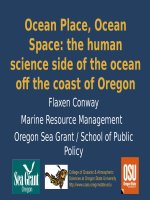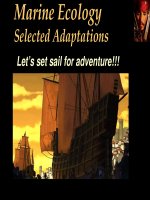Geography and Oceanography - Chapter 1 ppsx
Bạn đang xem bản rút gọn của tài liệu. Xem và tải ngay bản đầy đủ của tài liệu tại đây (1.54 MB, 42 trang )
GEO/OC 103
Exploring the Deep:
Geography of the World’s
Oceans
Lectures MWF
1:00 - 1:50 p.m.
Gilfillan Auditorium
4 credits
Today’s Tune:
from the soundtrack of
The Life Aquatic with Steve Zissou
Oregon State Oceanography
•
One of the best in the nation
–
Research productivity
–
National/international reputation
–
COAS ranked as high as 5th
nationally
•
Biological, chemical, geological, physical, geophysical, marine
resource management (MRM), atmospheric sciences
•
Climate Change Research Institute
OSU Oceanography cont.
•
Hatfield Marine Science Center
•
Integrated Ocean Drilling Program
•
Consortium on Ocean Leadership
•
National Center for Atmospheric Research
•
National Academy of Sciences Ocean Studies Board
•
National Oceanic & Atmospheric
Administration or NOAA!
www.coas.oregonstate.edu/marineportal
Required Book
“Exploring the Deep:
GEO/OC 103 Lab Manual”
Available in OSU Bookstore.
Each student needs his/her own copy.
Optional Book
“Invitation to Oceanography”
(5th edition)
by Paul Pinet
On reserve for FREE in library or available in OSU
Bookstore.
Labs
( labs start NEXT week in Wilk 210 )
•
Teaching Assistants
–
Jenna Halsey
–
Kelvin Raiford
–
Kate Sherman
–
Brian Wilson
–
Katie Woollven
•
Check course site or catalog for your lab time!
•
Learn your TA’s name from schedule, introduce yourself at first
meeting
Gilfillan
Wilkinson
COAS Admin
Library
NO LABS THIS WEEK
Key Locations
in Lab . . .
Work with real oceanographic data
Work with a geographic
information system
(GIS), a hot technology!
Lab 9:
Required Field Trip to Oregon Coast
Saturday, May 21, 2011
Bookmark this site!!!
/>This web site is your syllabus !!!
What Will I Learn?
•
NOT very much about whales and fishes!
•
Formation of the world’s oceans and ocean basins
•
Tsunamis and major earthquakes along the Oregon coast
•
Volcanic activity in the Cascades and just off the Oregon
coast
•
Currents and ocean circulation
What Will I Learn?
•
Chemistry of sea water and underwater hot springs
•
Waves and tides
•
El Niño and La Niña
•
Biology of the oceans, from one-celled organisms to whales
•
Protecting the oceans and coasts
•
Climate change, global warming… and more!
This class may NOT be for you if you can
answer YES to any of the following:
•
“I don’t expect to attend class very often.”
•
“Large, general education classes should not
require me to study very hard.”
•
“I am a graduating senior, am really tired of
school, and need one last, easy science
requirement.”
•
“Science is lame! I’m just doing this to satisfy
a requirement.”
•
“I hate the computer and don’t think it’s worth
learning how to use. Professors should not
require students to use a computer.”
This class will be GREAT for you if you can
answer YES to many of the following:
•
“I’m really interested in the Earth and am
willing to apply myself to learn about it.”
•
“I‘m scared of math, but willing to try.”
•
“I am willing to attend lectures, and go to
every lab section, because I know that I will
learn more if I do.”
•
“I’m worried about the future of the
environment and would like to know how to
interpret the claims of scientists.”
•
“I appreciate professors who use computer
and communications technology because it
improves the class.”
You should certainly take this class if you can
answer YES to any of the following:
•
I’m really worried, concerned, or even angry
about:
–
marine pollution…
–
global warming, hurricanes, tsunamis…
–
over-fishing of important fish species…
–
the Earth’s physical resources being over-used…
A Good Learning
Environment
•
Class attendance is KEY!
•
Class attendance for the ENTIRE class period is KEY!
•
Please don’t hold conversations or walk out in the middle of class
•
This class is not only about oceanography
–
Training for life and work AFTER college
•
Atmosphere of mutual respect
A Special Note to Athletes . . .
•
“It’s from my father,” Manning says, “he instilled a work ethic in
me. I think he meant it for academics, not football, because he
never pressured me in that direction. I just translated it to
football.”
ESPN.com, “The Son Also Rises”, article by Dave Goldberg, Associated
Press
Lecture Format
•
*notes provided as text and as PPT
–
text that appears on slides w/ SOME
supplements
•
curse & blessing
–
info all there but don’t space out
–
challenge yourself & us w/questions and
discussion
•
Different learning styles
•
Attend class (on time) and STAY the entire class period.
•
Read through a lab BEFORE your lab period.
•
Save eating for spaces outside the classroom (and clean up).
•
Participate. If you don’t understand something, ask. I can
guarantee…absolutely… that if you don’t understand something,
there are a dozen other people in the room, at least, that share
that confusion.
•
Be respectful of the other people in the room (no phones, no
newspapers, no conversations, careful with laptops!)
•
Remember that while you paid tuition for this class, so did the
people around you.
•
It’s a community.
GEO/OC 103: “Da Rules”
GEO/OC 103: “Da Rules” (cont.)
•
In-class work: only gets done that day, we don’t make it up.
•
Labs: show up, ask questions, complete the work… If you
have a conflict and MUST attend another section, let BOTH
teaching assistants know.
•
Honesty, ethics, cheating and plagiarism (do, do, don’t,
don’t).
•
Final exam is already scheduled. Plan for it. Contact us
next week regarding end-of-term conflicts.
•
Rules aside….if you struggle, if things are wrong, tell one of
us or your teaching assistants. We’ll work on solutions.
Exams & Grades
Exams & Grades (cont.)
Test 1 (W, Apr. 20) = 15%
Test 2 (M, May 16) = 15%
Final (W, Jun. 8) = 30%
6:00-8:00 p.m.
Labs (inc. field trip) = 40%
GEO/OC 103 Grades
Weighted Percentage
95-100 = A
90-94 = A-
85-89 = B+
80-84 = B
75-79 = B-
70-74 = C+
65-69 = C
and so on…
Mandatory
Field Trip to
Oregon Coast
May 21st
All Exams take place HERE
Final Exam
June 8th
6:00-8:00 p.m.
Questions??
Questions??
